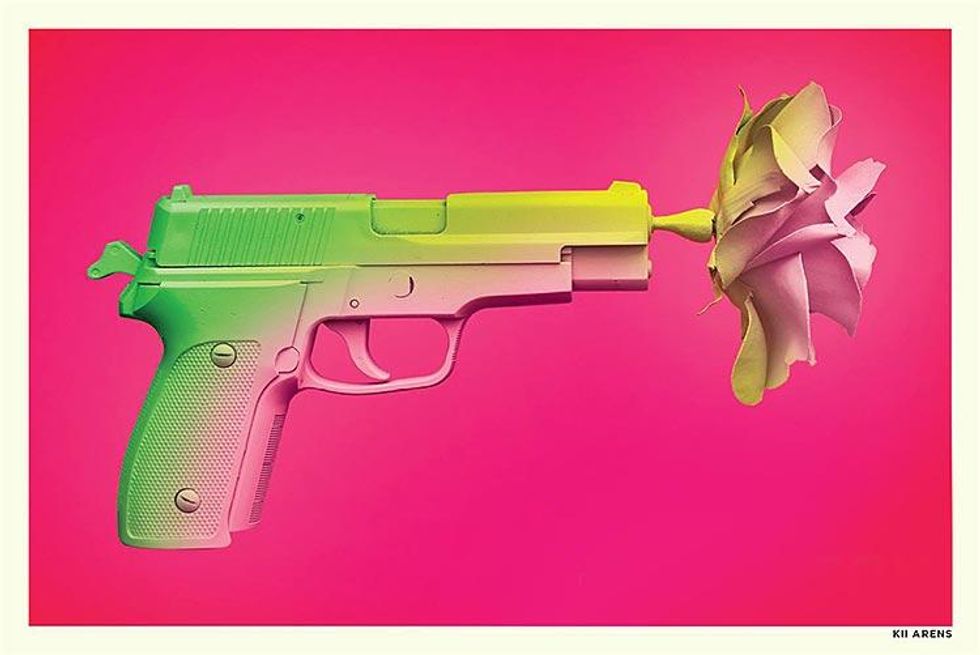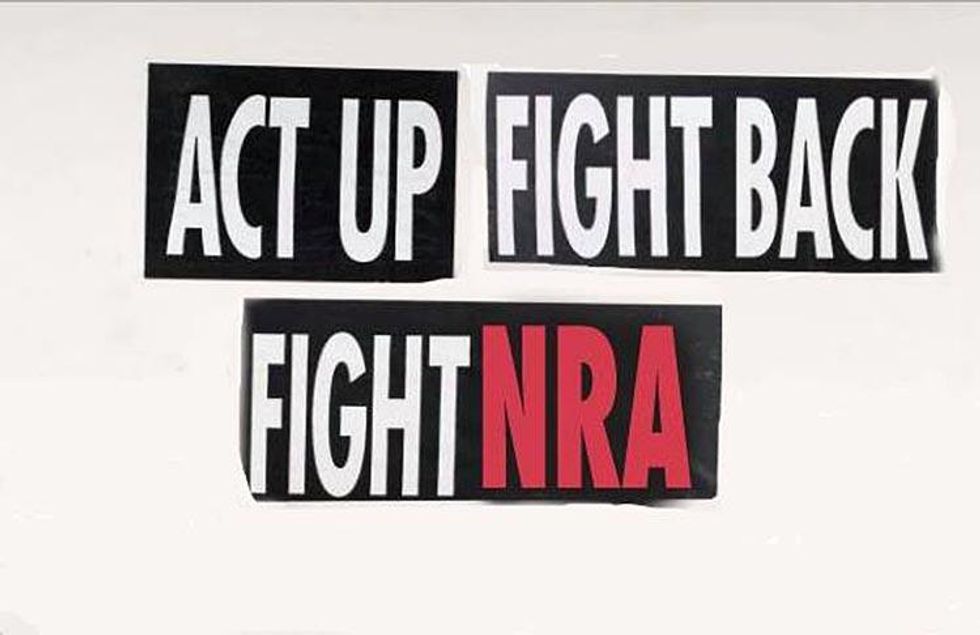Abe Gurko woke up on the morning of June 12 in his West Hollywood apartment to the horrific news that 49 people had been killed at a gay nightclub in Orlando.
But that wasn't the first thing to rush him out of bed that day. That Sunday was the last day of L.A. Pride in West Hollywood, and Gurko, who lives a block away from where all the festivities were being held, couldn't shut one particular voice out of his mind.
Through his open window, he could hear one man yelling "I hope you die from brain cancer!" to the LGBT crowd. Gurko, already upset over the news about Orlando, couldn't understand why this man was being allowed to yell hateful things at a Pride parade, especially after the Orlando shooting and then the report that a man had been arrested on his way to L.A. Pride because his car was full of guns and explosives. Gurko ran to where the yelling man was standing and was surprised to see police protecting him. "I get that he has freedom of speech, but he's inciting," says Gurko. But Gurko felt compelled to do something.
Gurko remembers living in New York City at the height of the AIDS crisis. "People were dying, and it was just an outcry because there was no medication, there were no social programs, people were being shunned left, right, and center," he says. Gurko says he "was HIV-positive way early in the game. Fortunately, I didn't die, but there's a reason for me to be here. ... If it affects you, you have to do something."
A few weeks after L.A. Pride, Gurko read an article in The New York Times about a die-in by a group going by the name Gays Against Guns. "They were above the fold," said Gurko." It was 11 p.m. in L.A. and 2 a.m. New York time when he read the article and decided to reach out to one of founders who was quoted. Gurko messaged him over Facebook and was suprised to hear a ping from the other side of the chat window. Kevin Hertzog was awake and responded right away. "What can I do? I'm happy to do whatever," Gurko told Hertzog.
Gurko excitedly sent Hertzog an image he had shared on his Facebook page, which referred to his ACT UP days: "ACT UP, FIGHT BACK, FIGHT NRA." Gurko had amended the famous ACT UP phrase from the 1980s and early '90s, which was "ACT UP, Fight Back, Fight AIDS." Eager to help the cause, Gurko asked Hertzog if there was anything he could do -- sell T-shirts, whatever, you name it. Hertzog told Gurko, "Why don't you start the chapter?"
The first chapter of Gays Against Guns formed in New York, but the group has been founding chapters in cities all over the country. More than 6,000 people are getting updates from its Facebook page. And, Gays Against Guns isn't planning only protests and die-ins. The group is targeting corporations such as BlackRock, the world's biggest investment manager, because it holds shares in both Sturm Ruger and Smith & Wesson, which are manufacturers of guns used in mass shootings. The group posted an open call for protestors to gather today at Paley Park in Manhattan at 11:30 a.m. before heading to BlackRock headquarters at noon. It could be the next high-profile protest that sparks yet another person to reach out, and yet another chapter of the group to be born.
(RELATED IMAGES: GAG and ACT UP: Learning From Your Elders)
Days before Bobby Heller and Gurko, the founders of the Los Angeles chapter, were preparing to hold their inaugural meeting, Heller stepped into the studio of one of the artists in the building that houses Opus, a creative branding and photographers' agency where they both work, and saw a painting he knew he had to have.
Hanging in the artist's studio was a painting of a gun with a flower in the barrel. Heller took it as a good omen because the group was about to meet, and he bought the piece. When Gurko saw it, he was moved to tears, because to him it not only represented Gays Against Guns but made him think of the shootings of anti-Vietnam War protesters at Kent State University in Ohio in 1970, along with other antiwar activities of the time. "The hippie puts the flower in the barrel of the gun, and that was my consciousness," says Gurko. "It was 1969 and I was a kid, but my sister was marching on the steps of Washington at the Moratorium," a demonstration seeking an end to the Vietnam War.
The American Medical Association has referred to gun violence as a "public health crisis." This is something familiar to ACT UP activists, who fought for the acknowledgement that AIDS was a public health crisis in the late '80s and early '90s. At Gays Against Guns L.A.'s first meeting, Gurko voiced a similar thought to the group. Yet several years ago Congress passed a law blocking the Centers for Disease Control and Prevention from conducting research on gun violence; the move had the backing of the National Rifle Association.
Heller also has close ties to ACT UP. "I lost every single friend I have between Boston, New York, and L.A. [in the AIDS epidemic] and I'm the last man standing," he says. After nearly 20 years of experiencing post-traumatic stress disorder, Heller has channeled his energy into activism for AIDS awareness. He joined, for instance, the group seeking to place a National AIDS Monument in a West Hollywood park.
The focus of Gays Against Guns is to "get the NRA puppets out of office," says Gurko. If the Los Angeles chapter manages to get one NRA supporter from California's congressional delegation out of office, it will have served its purpose, he says. At the inaugural meeting for the group, Gurko passed around a binder with the names of all the members of Congress from California who receive contributions from the NRA.
Last Sunday, the Los Angeles chapter staged its own die-in. The Gay Men's Chorus of Los Angeles joined the group and sang along with members. But Gurko has ambitious goals for the West Coast chapter evolving another kind of protest, one that he hopes will bring a creative energy to political protest that he contends is missing from activism. "I want our events to be about peace-loving and creative," he says. "I want to get the creative communities involved."
ACT UP was loud in ways that caught the attention of the media. In 1990 The New York Times said ACT UP members often seem "rude, rash and paranoid, and virtually impossible to please. And they are." But they were effective. Dr. Stephen C. Joseph, a former New York City health commissioner who had often been the target of ACT UP's protests, told the Times, ''There's no doubt that they've had an enormous effect. We've basically changed the way we make drugs available in the last year.'' Gays Against Guns is hoping to be just as effective, and Gurko wants the L.A. chapter to play a big role.
Gurko hopes Gays Against Guns L.A. protests resemble "happenings" from the '60s. "It should feel like a party," he says, "so that there's people giving out flowers, there's people lying out on the ground, there's people handing out information, there's people talking to the media -- that's how I see it."
"Think Woodstock with a message," says Gurko, laughing. There might even be a couple of people smoking pot in the crowd, he joked. As someone with a background in event production, Gurko realizes the importance of making events fun so people feel compelled to return again and again. "If you don't make it fun, don't expect a lot of people," he says. "Not everyone's going to want to get heavy every time."
"I could be wrong, and I'll be proven wrong, and that's fine," he says, "but I'll be damned if I'm not going to try it."

















Charlie Kirk DID say stoning gay people was the 'perfect law' — and these other heinous quotes
These are some of his worst comments about LGBTQ+ people made by Charlie Kirk.